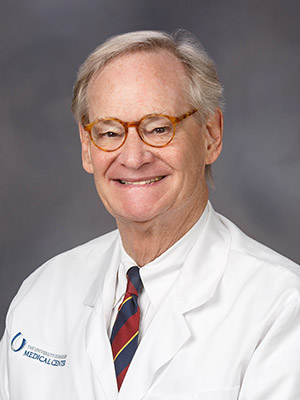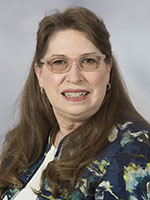End-of-life directives speak for you when you no longer can
Note: This story appears in the April 2019 edition of CONSULT, the monthly e-newsletter published by the UMMC Division of Public Affairs that focuses on cutting-edge clinical advances, innovative educational programs and groundbreaking research occurring at UMMC. To receive CONSULT in your email, visit www.umc.edu/CONSULT to sign up.
It’s known by many names – living will, medical power of attorney, personal directive, advance health care directive, advance directive.
It also raises a number of questions not many people want to think about: What if I catch a fatal disease? What if I suffer a mortal injury? What if I’m so sick I can’t make decisions for myself? How far am I willing to go to prolong my life? Who will speak for me when I can’t speak for myself?
The advance directive is a legal document that allows you to answer those weighty questions now, in hopes of lightening an unforeseen burden later on – for the sake of yourself, your health care providers and your loved ones.

“If you have an advance directive, you will have less hospitalization at the end of your life and more hospice care, if that’s what you want,” said Dr. Keith Mansel, professor of medicine and director of palliative and supportive care services at the University of Mississippi Medical Center. “You die where you want to die.”
Estimates of the number of Americans who have completed a directive vary widely; one of the highest is 37 percent. The younger you are, the less likely you are to do it, or to think about it.
“Denial is a very strong emotion,” Mansel said, as are attachments to certain cultural and religious beliefs.
Misconceptions also get in the way.
“Some people don’t understand that this only kicks in when you can’t make your own decisions,” Mansel said.
Some other false assumptions undermine action, said Sue Ann Meng, a social worker for the UMMC Memory Impairment and Neurodegenerative Dementia (MIND) Center.

“’Someone’s going to pull the plug’ is one,” she said. “That’s not true, but end of life is a difficult discussion. Certainly, if there’s a terminal illness, it’s a necessary one.”
Advance directives should not be confused with Physician Orders for Sustaining Treatment, although a POST does concern end-of-life imperatives. A legal document similar to a “Do Not Resuscitate” order, it is a signed notice from the physician of a terminally ill patient who has decided to forego lifesaving measures during a medical emergency.
In recent years, UMMC has tried to eliminate confusion about advance directives. To make it easier on patients, the Medical Center offers its own document – the UMMC Advance Healthcare Directive – which promises to be “valid in any health care setting.”
Other hospitals and organizations, such as the American Association of Retired Persons (AARP), provide directives that meet Mississippi’s requirements.
“At UMMC, we will accept any documents that comply with Mississippi law,” Meng said. “But I would recommend ours for our employees and patients.”
Advance directive forms are made available to patients at UMMC and other health care settings. Patient check-in forms include the question, “Do you have an Advance Directive?”
“Most people just mark ‘no’ and move on,” Meng said. Or they ask a question of their own: “Do you think I’m going to die?”
“We try to let people know it’s just part of good planning, because emergencies can happen to anyone, any time.”
Also known as “the Five Wishes,” these big-picture decisions were famously made by former President George H.W. Bush and former First Lady Barbara Bush.
“It’s about how you look at life, about what you value and what you don’t value,” Mansel said.
It’s named for the number of wishes it grants:
• the person you want to make health care decisions for you when you can’t;
• the kind of medical treatment you want or don’t want;
• how you want people to treat you;
• what you want your loved ones to know; and
• whether the focus on quality of life outweighs the potential distress of aggressive treatment.
“Some people want to prolong life,” Mansel said. “Others prefer a good quality of life. Sometimes values compete with each other, though.
“’‘I don’t want a feeding tube’ may clash with ‘But I want to live as long as I can.’”
Without a living will, your legal next-of-kin will make those decisions based on whatever the two of you may have discussed at one time, Meng said.
“But in a crisis situation, you as the next-of-kin are thinking with your heart, not your head.”
As Mansel put it, “You as a family member must consider what the loved one would want, not what you would want.”
Meng has sat down with her own loved ones to discuss their requests.
“I can say it’s so much easier to have that conversation beforehand,” she said.
Without a designated decision-maker, and when the legal next-of-kin are the children and not the spouse, the majority rules, Meng said. If there’s a tie vote, then the health care team tries to get the loved ones to reach a consensus or to appoint a spokesperson.
“I’ve worked with families that had as many as 10 children – all with different opinions,” Meng said.
In one case, a man who suffered a debilitating stroke had fathered children not only with the woman he had never divorced, but also with the woman with whom he was living. His wife, who was considered the legal next-of-kin, wanted her children to make the decisions, leaving out the other woman’s children.
Until the two factions agreed on whether to continue life support, there was a “huge rift,” Meng said.
Advance directives are designed to head off such conflicts. Patients who are trying to reach these decisions before they are unable to may seek the help of the medical staff, including a social worker, case manager and primary care physician.
“Medicare will pay for a physician visit solely to discuss this,” Meng said.
Once an advance directive form is filled out, there are two ways to have it validated. One is to sign it in front of two witnesses, neither of whom is directly related and neither of whom would benefit directly from the patient’s death – via insurance claims, etc.
“You can get a next-door neighbor or a church member to witness it,” Meng said.
The second way is to have it notarized. For UMMC patients and employees, notaries provide free services on campus.
After the document is notarized or witnessed, it becomes a legal document. But you can change it later, Mansel said.
“It’s hard to know exactly how you may feel down the road. Your perspective may change: You have a new grandchild. Or your spouse dies.
“About one-third of the time, people who become seriously ill change their minds about their original decisions.”
Whatever you decide, make a copy – which is as good as the original, Meng said.
“Keep one in your car; keep one at home. Let your kids know which drawer it’s in. If you’re in the hospital and unable to communicate, no one may be able to get to it. And then it’s not going to do anyone any good.”
Mansel recalled one patient who made sure his wishes were handy.
“He had been in a devastating accident. His daughter brought in instructions that were notarized, handwritten and titled ‘A Life Directive.’
“I love the thought that he had given his daughter a document that said, ‘This is not about how I want to die; this is about how I want to live.’”



